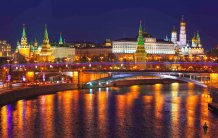Articles

Researchers mapped the malign Russian practices via a literature review of existing studies on overseas practices by those connected with the Kremlin
New study maps the influence of organised crime and the wealthy over Russian foreign policy
Russian foreign policy-making is often guided by elites, intermediaries, private companies, and organised crime groups rather than the national interest, a new study shows.
Identifying and tracing Russian illicit financial flows is very difficult due to the politicised nature of authoritarian legal systems and data gaps. Being able to “follow the money” is hard because there is minimal formal regulation or oversight.
Researchers mapped the malign Russian practices via a literature review of existing studies on overseas practices by those connected with the Kremlin. This allowed them to categorise different types of influence which created conditions friendly to illicit financial flows. This included political activities, which blur formal and informal means of diplomacy and political influencing to promote Russia-friendly candidates and political parties; media activities, which blur truth and falsehood by constructing and disseminating narratives painting Russia and pro-Russia actors in a positive light; and political violence, which blurs legitimate and illegitimate use of force to secure investment projects, destabilise regions and undermine or eliminate opposition.
The research was conducted by Catherine Owen and Tom Mayne from the University of Exeter and Tena Prelec from the University of Oxford and University of Rijeka. It was carried out as part of the Serious Organised Crime & Anti-Corruption Evidence (SOC ACE) research programme, which is funded by the UK’s Foreign, Commonwealth & Development Office (FCDO).
Dr Owen said: “It is virtually impossible to disentangle the relationship between Russian foreign policy and Russian illicit financial flows since Russian foreign policy has a strong illicit financial – or kleptocratic – element.
“Where there is Russian formal foreign engagement, it is also likely that illicit financial flows are present. Russian foreign policy initiatives expedite the overseas investment of corruptly acquired money; therefore, the informal, patronal relationships that facilitate this, as well as the domestic political conditions in which they are embedded, are key factors in Russian foreign policy decision-making.”
Dr Mayne said: “It is hard to prove the presence of specific illicit financial flows, but our research suggests malign overseas activities funded by Russian elites seek to produce outcomes beneficial to Russia’s Kremlin-connected billionaires.
“The ‘political’, ‘media’ and ‘violence’ are used alongside one another and mutually reinforce one another.
“The principal actors in Russian foreign policy-making and -doing are not state institutions but elites, intermediaries, private companies, and organised crime groups, and the form they take is quite different.”
Dr Prelec said: “Russia’s formal foreign policy initiatives can provide legitimation, or ‘cover’, for recently established IFF and, on the other, IFF can build on or cement relationships forged through formal foreign policy agreements. Often those individuals forging such agreements – both on the Russian side and in partner countries – are very wealthy individuals with personal connections in a range of industries and sectors, who can use these agreements to enrich themselves.”
Date: 16 August 2022
